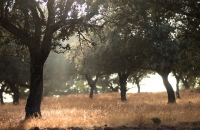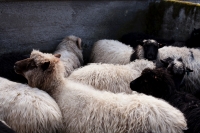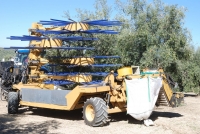Silvicultural treatments can increase the capacity to absorb carbon in forests
Escrito por UCC+iThe Department of Forest Engineering at the University of Cordoba used LiDAR (Light Detection and Ranging) technology to plan Aleppo pine replanting in search of the highest absorption of carbon
The current importance of climate change has turned carbon sequestration into the focus of strategies aimed at reducing the concentration of CO2 in the atomosphere. Given their role as sinks for natural carbon, forest ecosystems can be allies in environmental sustainability. However, the challenge in research lies in increasing the “sequestration power” of these ecosystems.
Research at the University of Cordoba underscores the importance of water stress on the response of Holm oaks facing Phytophthora infection
Holm oak decline is threatening the sustainability of the dehesas, making it one of the most worrisome problems in the field of forest health for the scientific community. Depsite considering the pathogen Phytophthora cinnamomi the main trigger for this situation, external conditions, such as extreme drought, are also determining factors in the process of dying woodland.
Small family run livestock farms stand out in Cordoba’s dehesa
Escrito por UCC+iA University of Cordoba study maps out the characteristics of dehesa farms associated with feeding cooperatives in Los Pedroches and Upper Guadiato
A dehesa is a distinctive ecosystem in the Mediterranean areas of the Iberian Peninsula labeled High Nature Value due to the value of its ecosystem services and its role in conserving biodiversity. An image of vast land sprinkled with holm oaks and cork oaks where extensive farm animals graze is the most common one that comes to mind when describing the topic of the dehesa, but what occurs when we zoom in on this image?
The chromosome responsible for asparagus gender is characterized
Escrito por UCC+iA University of Cordoba research project draws a genetic map of garden asparagus and marks the chromosome determining gender
Garden asparagus is, from a financial perspective, the most important asparagus species of all. Its cultivation area is equal to that of garlic, carrots and eggplants, making it decisive for the asparagus sector.
A research group at the University of Cordoba Genetics Department has analyzed gene variation in five Spanish sheep meat breeds as the first step to increase profitability in livestock
How could a sheep farmer’s job be made easier if they had a tool to choose the meat breed best suited to their needs beforehand? Much money and time would be saved by using a panel of markers to select a breed with genes associated with meat production. Finding an efficient and cost effective way to do so led the AGR-2018 “Improving and conserving genetic resources of domestic animals” research group to count sheep and above all, to analyze the genetic variability of their RNA (ribonucleic acid).
A new harvester decreases the cost of olive picking in traditional olive groves
Escrito porThe University of Cordoba Mechanization and Rural Technology research group designed a harvester that improves the profitability of traditional olive farming
Productive traditional olive groves, which make up 70% of Andalusian olive farming, are in a complicated situation in terms of financial sustainability. The lack of mechanization so vital to picking olives has made new already-mechanized plantations such as intensive and superintensive olive groves surpass traditional olive groves, which still spend 40% of their harvesting budgets on picking.







